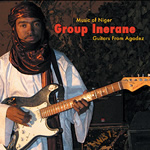|
|
 |
Dusted Reviews
Artist: Group Inerane Album: Guitars from Agadez (Music of Niger) Label: Sublime Frequencies Review date: Oct. 2, 2008 |

|
|
|
 |
The Tuareg people of Northern Africa operated the much-coveted trans-Saharan caravan trade for centuries. Nomadic pastoralists and broadsword-wielding raiders, the fiercely independent people have resisted European hegemony since the late nineteenth century. The latest revolt was in the early 1990s against the governments of Mali and Niger over their desire for self-governance of their traditional homeland. The uprising introduced a new form of rebellion thanks to the initiation of the electric guitar in Tuareg culture: political commentary relayed via song. Cassettes of such music carrying messages through Libyan Refugee camps – referred to as the Tuareg Guitar Revolution – spread quickly across the Tuareg society (whose population is well past the million mark) and, unsurprisingly, was banned by the opposing governments. The 1995 Peace Pact Accord between the governments of Mali and Niger and the Rebels may have stopped the violence, but the electric guitar and political song influence on the culture was here to stay.
The most famous of the Tuareg guitar style bands is Tinariwen, who found a worldwide audience after 2004’s Amassakoul. Sublime Frequencies’ Hisham Mayet and Alan Bishop dug up another great Tuareg band for their second LP release: Group Inerane’s Guitars from Agadez (Music of Niger). It has since become one of the label’s most sought-after releases (out-of-print after its initial 1000-LP pressing in 2007) and is now being reissued on CD.
Helmed by the enigmatic guitar player Bibi Ahmed, Group Inerane (pronounced inner-ANE) encompasses the most exciting aspects of the Tuareg guitar style. Ahmed and fellow guitarist Adi Mohamed trade elliptical and bluesy riffs over minimalist rhythmic patterns and a chorus of chanting and undulating female vocalists. Thanks to the rudimentary and live recording process by Mayet (from 2004 and 2007) and the idiosyncratic tone of their guitars and buzzing amplifiers, Guitars from Agadez takes on a new form of Saharan psychedelia. One can hear amplified roots rock and blues elements in the music, but it doesn’t sound influenced by American or European counterparts. It sounds as secluded as its geographic homeland, though surprisingly very accessible to ears from outside the culture and region. And like the Tuareg people, the music is resilient and commanding, making for a continuously exciting and eye-opening listen.
Album opener “Kuni Majagani” is the go-to track with its warm guitar tone and defining circular riff. Though the tempo doesn’t increase, the song somehow gains momentum as it grooves to an eventual climax of trilling female vocalists. It is easy to hear why this musical style was utilized to energize the rebel troops. “Telilite” may be the most sonically interesting track, though. A steady and nearly funky drum kit rhythm overpowers the galloping guitar lines, but the vocalists are the stars of this song. They trade whoops and hollers with loud hisses and exclamatory trilling, somehow sidestepping cacophony in the process.
Count yourself lucky if you were able to snag one of the initial LPs, as they come pressed on beautiful 180-gram vinyl and in a full-color gatefold jacket with stunning photos of the band. If you slept on it, the CD is still very much worth your time because this music is not to be missed. As the style continues to be popularized outside its home region and culture, it will be interesting to hear how outside influence will affect traditional acts. And in the same breath, will it have any affect on our domestic acts? One can only hope.
By Michael Ardaiolo
|







